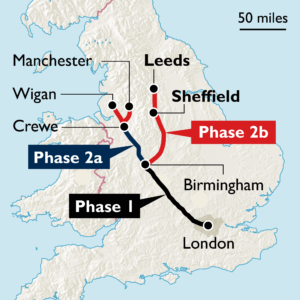High Speed 2 is a new ‘carbon neutral’, high-speed railway service aiming to better connect the English regions of the South and the North by travelling of speeds up to 400 kilometres per hour.
Phase 1, London to the West Midlands is in the early stages of construction. However, Boris’s Johnson’s cabinet recently gave approval to the rest of the HS2 project which will connect the West Midlands to Leeds and Manchester. The Prime Minister believes this project will become a ‘new anatomy of British transport‘ and boasts a cut down in train fares, an increased capacity and faster travel times. These will allow better access to the North which is currently reliant on outdated and limited low-speed lines. However, a survey found that 36% of the public would not let the project go ahead, in comparison to 26% who would. This disapproval is largely down to the constant increases in cost from £32.7 billion up to £106 billion, highlighting that the original predictions were considerably underestimated. As well as the alarmingly rapid rise in costs, there are also concerns over the environmental impact of HS2.

This Government is committed to the establishment of a high speed rail network as part of its programme of measures to create a low carbon economy.
This statement given by the 2010-2015 Coalition government promoted HS2 as a leader in new environmentally-friendly travel by claiming it would be broadly carbon neutral. This is because it is forecast to reduce the usage of carbon-releasing motor vehicles and planes to travel across the UK. The project claims that ‘in 2030 you could travel 500 miles on HS2 for the same amount of carbon it takes to travel around 70 miles by car and just 29 miles by plane‘.
HS2 Ltd. also addressed its plans for the project to make use of electric trains only, as another way to highlight its carbon-neutral aspirations. Upon parliamentary scrutiny, however, the study which these claims were based upon was described to be ‘questionable at best‘ by Green Party MP Caroline Lucas. The report by the House of Commons Transport Select Committee dispute the claims made by HS2 Ltd. and state the project will only make a small contribution to carbon reduction targets. Extinction Rebellion (XR) also acknowledge how there would only be a 4% decrease in car usage and a 1% decrease in aviation. This low degree of transport shift will do little to reduce carbon emission. XR’s statement shows that whilst the government proposes carbon neutrality and climate change prevention, their actions don’t reflect their message.
As well as this, the route planned for HS2 means it will have a direct impact on surrounding wildlife and biodiversity with over 690 local wildlife sites affected by Stage 1 alone. It’s estimated that for every 100 metres of track, 2.5 acres will be lost due to the large width of the railway tracks designed to accommodate trains travelling speeds of 400 Km/hour. In addition to this, HS2 requires a straight route and therefore cannot divert around natural environments that would ideally be preserved. It is estimated that 5,000 acres of land in total will be lost from Phase 1 alone.
As well as the loss of rural land, HS2 will cause substantial damage to several European Protected Species that habituate the planned route. There are particular concerns over the rare Bechstein’s bat that is restricted to mature native woodland in the UK. Its reliance on such a niche habitat means that its removal will severely reduce the numbers of an already-endangered species. HS2 threatens to do this by building on this type of habitat and causing fragmentation which will also reduce biodiversity of the woodland.
In response to the concerns, HS2 Ltd now plans to create a ‘Green Corridor’ stretching alongside the railway by planting 7 million new trees and creating tailor-made homes for wildlife. However, the Wildlife Trust state that HS2’s proposed mitigation strategy is an ‘amateurish suggestion of paltry measures in the wrong place‘ and instead urge the Prime Minister to stop and rethink before it’s too late. The Trust instead propose a “greener vision” of HS2 by creating 1km of wildlife-rich landscape either side of the line to link existing wildlife and buffer them from the railway. Following this, over 66,000 people over the UK signed the Wildlife Trust’s letter urging the government to stop and rethink HS2; however, the Prime Minister is yet to respond. This letter is not the only public protest against HS2. Chris Packham (English naturalist and University of Southampton alumni) has created a fundraiser to finance a legal suit against HS2 in a bid to stop the project and the destruction it will cause. This has currently raised £37,480 of the £30,000 target.
The public campaigns to stop and rethink HS2 clearly shows the level of public objection to the project that should not be ignored by the government. The environmental implications have largely been overlooked and most compensatory measures proposed by the developers have been proven to have little effect if put into practice. The impacts HS2 will have clearly need to be considered further. Hopefully this will occur before the negative impacts on the British countryside are too large.
To read more on the HS2 stop and rethink campaign please click here, and to read more on HS2’s current Phase 1 environmental statement please click here. Chris Packham’s fundraiser is open until the 25th of February, and you can read more of his plans here.



